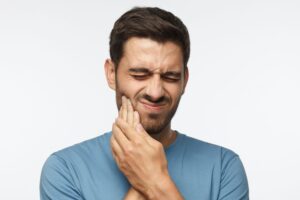If you have constant or recurring pain in your jaw, you may have TMJ (temporomandibular joint disorder). TMJ is a condition that affects the movement of the jaw joint. The jaw joint utilizes a hinging motion to open and close your mouth. If you experience pain in this area, it can affect your ability to eat and speak.
There is not one definite cause of TMJ. Anything from a muscle imbalance to trauma can alter the way your jaw moves. In fact, you can genetically inherit a deformity in the joints, muscles, or ligaments. Additionally, grinding your teeth can cause TMJ to develop.
There are a variety of issues that TMJ can cause.

Jaw Pain
TMJ can create pain in your jaw and within your jaw joint. Many issues can cause this, including arthritis, joint deformity, or problems with the muscles. Pain with TMJ can range from mild (popping or grinding when opening your mouth) to severe (locking of the jaw). Sometimes, TMJ causes a pain that feels like an earache. When the pain is within the muscles, it can seem like you have an earache, even though it is not.
Headaches
Chronic headaches are common among people who have TMJ. For example, grinding or clenching your teeth can create excess stress within your jaw. Your jaw is not designed to undergo this extra pressure, which can irritate the joints and muscles. The tension can radiate from your jaw to other parts of your face and neck, causing headaches.
Disrupted Sleep
If you have constant pain in your jaw and head, it can affect your sleep patterns. Sleeping can prove to be difficult for people with moderate to severe TMJ. When your face is painful to the touch, lying on a pillow can create an uncomfortable feeling. Additionally, chronic headaches can make it hard to fall asleep and stay asleep. As a result, you may find yourself feeling unrested and irritable.
Treatment Options for TMJ
There are many ways to treat the symptoms of TMJ.
If overuse is causing your TMJ, you can rest to minimize your symptoms. In fact, the muscles in your face are like any other muscle group. If you overwork them, you will feel sore. This is one way that TMJ presents itself. You can reduce how much you speak and try eating softer foods.
Another method of treating TMJ is through physical therapy. If you have a muscular imbalance, physical therapy can retrain how the muscles move. A physical therapist will walk you through many different exercises to alter the way your mouth moves. This can help minimize your TMJ symptoms.
Additionally, you may try ice or pain medication. Ice can help reduce pain and minimize swelling or inflammation. When combined with pain medication, it can eliminate your pain and discomfort.
If you talk to your dentist, they can create a custom mouthguard. You will wear the device at night to cushion your teeth against any excess pressure.
Finally, severe cases of TMJ may need surgical treatment to relieve your pain.
